Finding opportunities for growth in urban spaces
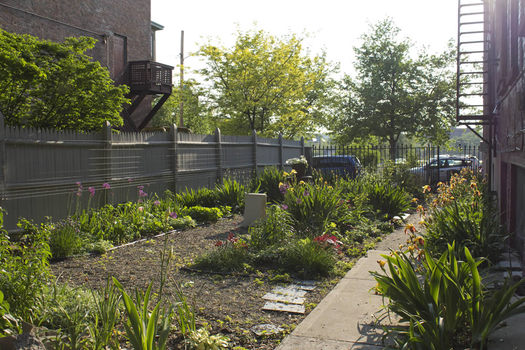
Living in a city often means that you have to make the best of extremely limited outdoor space. If you're lucky enough to have a yard, stoop, or fire escape, it can be a challenge to flex your green thumb in any significant way.
Emily Menn, a Troy real estate developer and landlord, has been working on green space in Troy for the last eight years. And she's transformed a neglected double lot into a budding downtown oasis.
I chatted with Emily about how gardens in cities can build community, as well as the challenges and opportunities of urban gardening.
Could you tell me a little bit about yourself, and how you ended up in Troy?
Well, I moved to Troy for a job. I worked for a non-profit that worked with the court system. I went to law school in Milwaukee, at Marquette, and I'm originally from Wisconsin. So I moved here in 2007, and didn't know anybody.
I walked to work past all these beautiful buildings every single day. I moved here from Milwaukee, so when people are like, "Troy is so rough," I was like, 'Are you kidding me?' It's not rough. Compared to suburbia, sure...
My family had rental property in the Midwest, and every time I'd go home and visit them, I'd be like, "Troy is amazing. Troy, Troy, Troy." We just got to talking, and the two colleges, beautiful housing stock, being pretty affordable, and people were just starting to discover it. Troy has this thing where there's this little bit of visionary and pioneering inventiveness. There's sort of a lot of nerds; so it's a lot of outsiders and eccentrics, which I love.
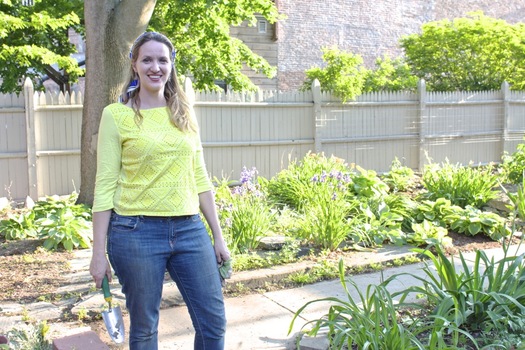
So we bought some property and kept adding to it, and before I knew it, I wasn't in the non-profit world, I was doing landlording full-time.
How many buildings or units do you have now?
I have 10 buildings downtown.
All downtown Troy?
Yup, near Sage and Washington Park, and Little Italy.
So that's like, what, 50 units or so?
Yes, about. I have people who have moved here from all over the country, all over the world. I have one tenant who is finishing her PhD at RPI, and she was figuring out if she wanted to base her business in Brooklyn, Boston, or Troy.
Did you convince her?
She was like, 'Oh my god, for what I would pay for a closet in the city, I have a beautiful apartment on the park.' She said. 'I can run my business here, and I don't have to look over my shoulder worrying about people stealing my ideas.' Really interesting people are just drawn to Troy.
[The conversation then turned to the garden.]
Creating a space like a garden was my first project. The inside of the house needs work. The apartments are nice, but the lobby is a mess, and my apartment is a shithole.
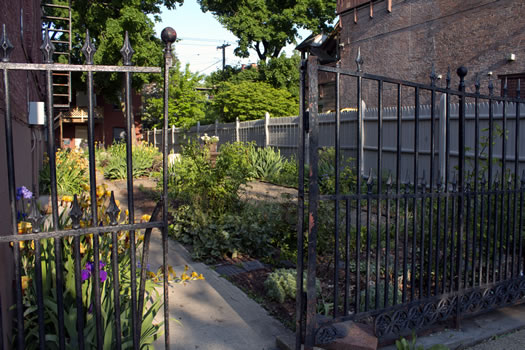
You sort of start to make these private, but public spaces. It brings interesting people together who have chosen Troy, and it builds these little knots of community. You always have something to talk about -- 'the flowers are blooming,' 'Oh, I need to rake,' 'I need to weed.' 'Oh, I can help!'
For the gardens, is this your primary space? Have you tried to develop gardens at all of your different properties if they have outside space?
This is the one that I've done the most work on myself. The before... it was gross. There were five more trees back here, including one that was taller than the building that was a giant pine tree. And plenty beer bottles, and cigarette butts. It was sketchy.
The first thing I did was I cut down the pine tree. I didn't know you needed a permit to cut down a tree like that. Code came and said, 'Where's your permit?' I was like, 'I'm so sorry,' and went full-on Midwestern and cried.
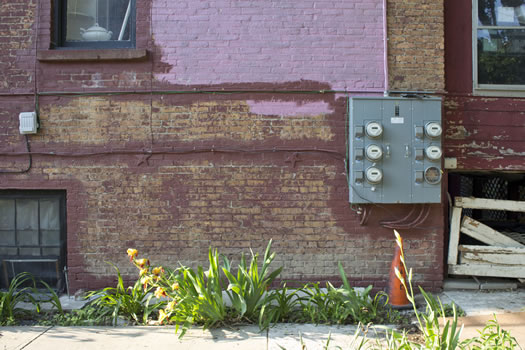
What do you think makes urban gardening unique or different from other spaces?
There's a bunch of different things. Obviously, you have less land to work with. So, use all your space. I put a lot of things in pots. I take them in in the winter. I have like a 25 percent kill rate. Some of the best advice I got was, 'Plants die, don't beat yourself when you kill them, it's not the end of the world. It's part of learning.' You can move them around, depending on the light, move them around on how much effort you want to put into watering them. Because, when they're scattered all over the place, it's a lot of effort.
Container gardening is also really nice. Some of my tenants do it where there is literally no yard, or it's ground where it is such hard, packed dirt it might as well be concrete. They'll do it in 5-gallon pails for vegetables. The downside of an urban environment is, not downside, but there's been buildings there that get knocked, and then get built up again. If you put a shovel in the ground, you will hit a brick. They also were covered in lead paint, and who knows what else. You can test, you can find out what's in your soil, but you know, plants will absorb that and if you're eating said plants, and you know, it goes someplace.
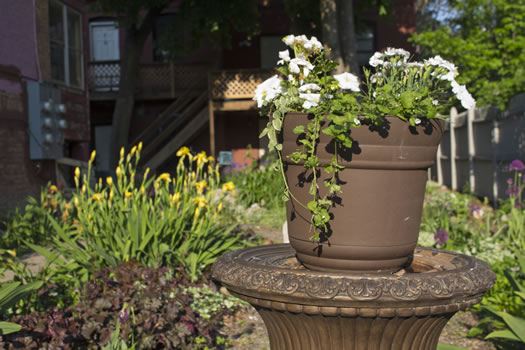
My garden is mostly perennials. Most of them I've actually gotten as divisions from other people. Some from my family. I have driven a lot of these plants from Indiana, Wisconsin, and the Midwest. Some of the hosta is from the family farm and has been in the family for over 100 years, which is kind of cool. The lilac, which maybe will survive there, is from the house that I grew up in. So maybe it will survive, maybe it won't, but we'll give it a shot. Flowers are sort of stuff you swap with neighbors. Obviously, in an urban garden, you have a limited amount of space, when you find stuff that works and it's happy, you know it's something you can share with other gardeners who have similar conditions.
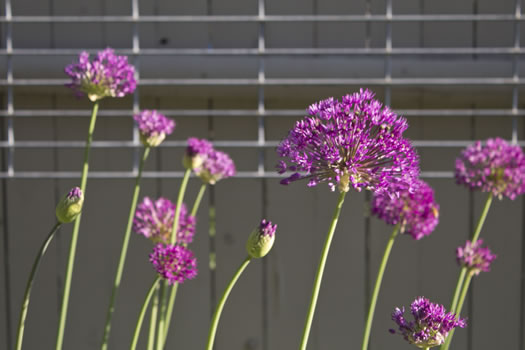
It takes a lot of patience. Just be okay with murdering plants. It's not the end of the world. They're going to get us in the end anyway, so it doesn't matter.
Is there anything else you wanted to say?
It's like anything. You can make as much of the resources you're given as you choose. I could have very easily left this, like a patch of clay, and no one would have said anything. It would have been OK.
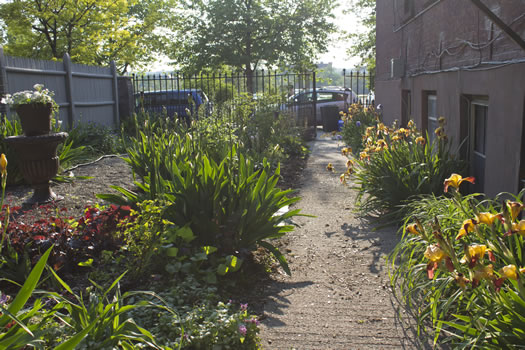
I think it's one of those things -- it's an opportunity. Even if it's something like putting a bunch of potted plants out on your front stoop, it's just an opportunity. I've talked to people who say, 'I think people would mess with them.' So what? Maybe they'll mess with them once or twice, but not forever. You put out plants and flowers in front of your house, it can change the tone of an entire block.
You just have to make the opportunity out of the resources you have. The more you ask for help, the more resources will come. Ask people for plants if you can't afford them, and they'll come. I asked a friend for help digging in the ground, and she needed to dig. She was at a point in her life where digging in the ground was the best thing for her. I just asked, and people responded.
This interview has been condensed and lightly edited.
____
You can see Emily Menn's garden, along with other downtown Troy urban gardens as part of Troy's 17th Annual Hidden Garden Tour this Thursday, May 26 from 4 to 7:30 p.m. Tickets for the self-guided tour are $10 and available online. The tour is a benefit for Friends of Prospect Park.
Lauren Hittinger Hodgson is a freelance writer and contributor to AOA. She lives in Troy with her husband, baby, and dozen almost-dead houseplants.
Hi there. Comments have been closed for this item. Still have something to say? Contact us.
Comments
"They also were covered in lead paint, and who knows what else. You can test, you can find out what's in your soil, but you know, plants will absorb that and if you're eating said plants, and you know, it goes someplace."
This is really, really important for anyone considering urban vegetable/herb gardening. Glad Emily mentioned it, adn that she's making the most of her space!
... said -B on May 25, 2016 at 3:59 PM | link
Nice interview. Thank you! Good work, Emily! Hooray.
... said Steve on May 25, 2016 at 9:41 PM | link
Use of these empty lots in Troy is an excellent idea to reduce blight and develop underutilized space. Troy is peppered with empty lots in otherwise dense urban zones. Obviously the best solution is infill construction to expand the tax base. Second best is garden use.
It would be cool to see an official effort to connect the owners of empty lots and Troy residents willing to use the space for gardening or small-scale farming. It could really help to increase property values, assist in drainage for Troy's poor sewer system, and potentially synergize backward overflow.
... said Sean on May 26, 2016 at 10:09 AM | link
Troy needs some Gravely garden tractors pronto!
... said Justin on May 26, 2016 at 3:58 PM | link